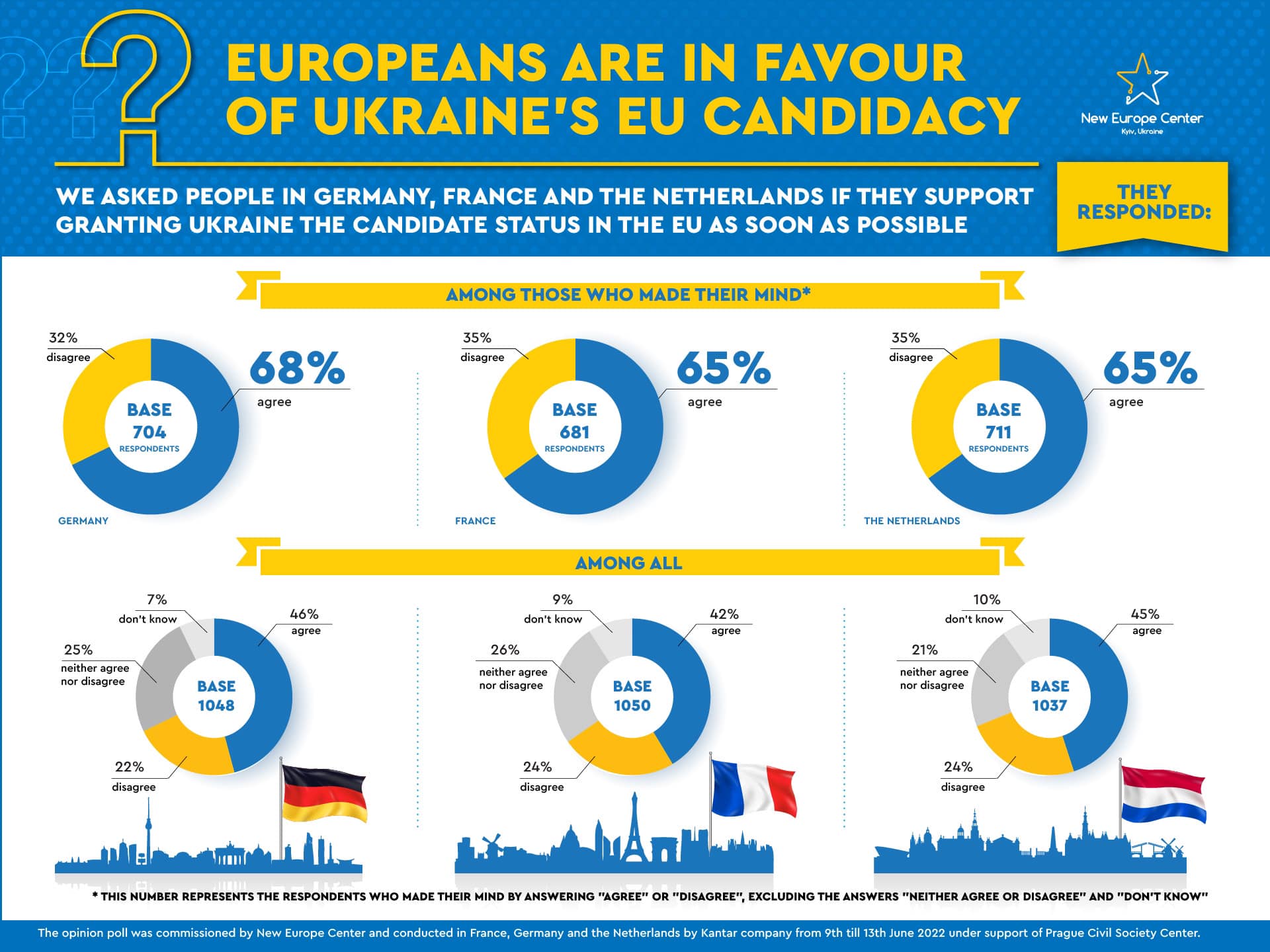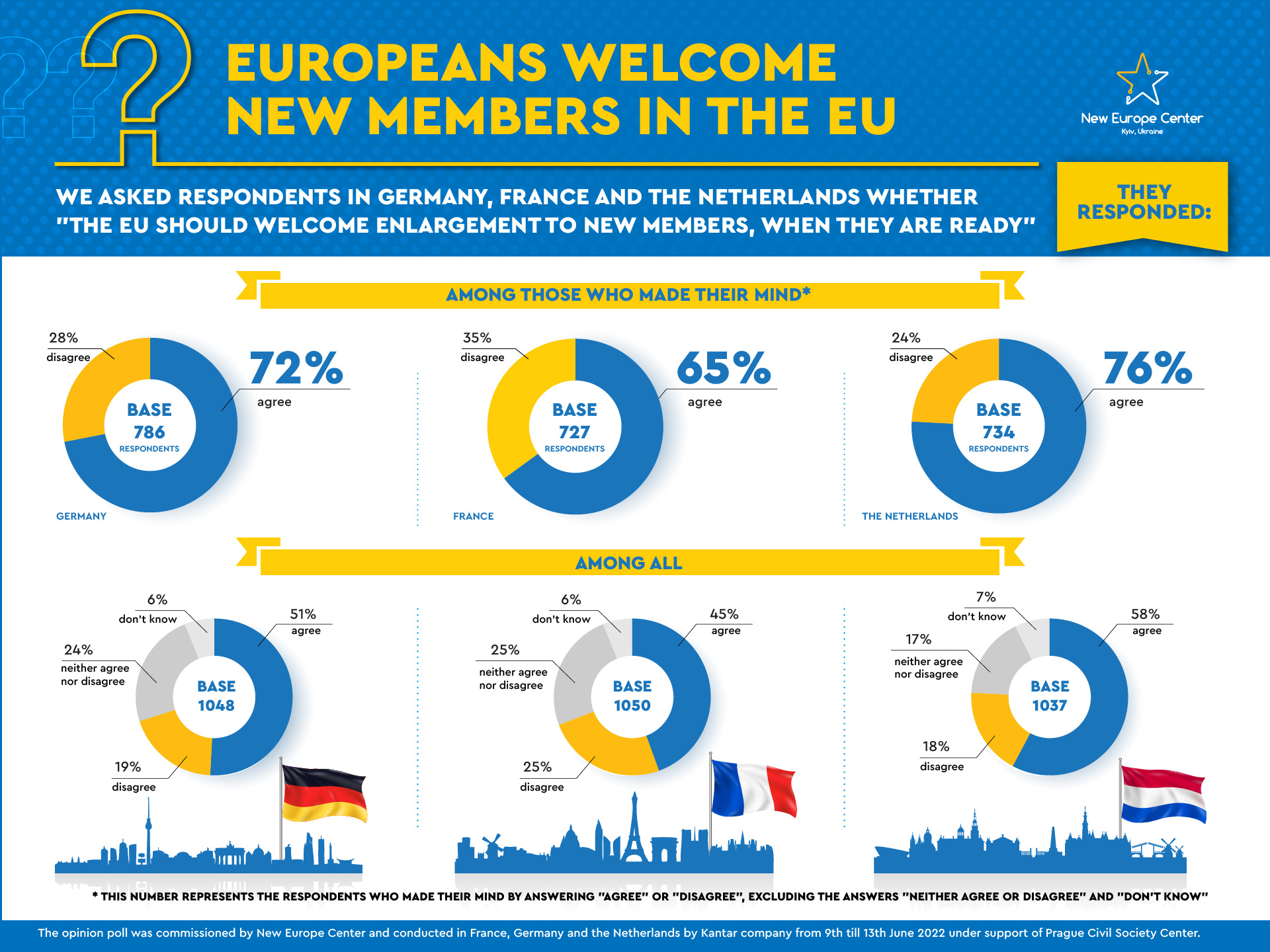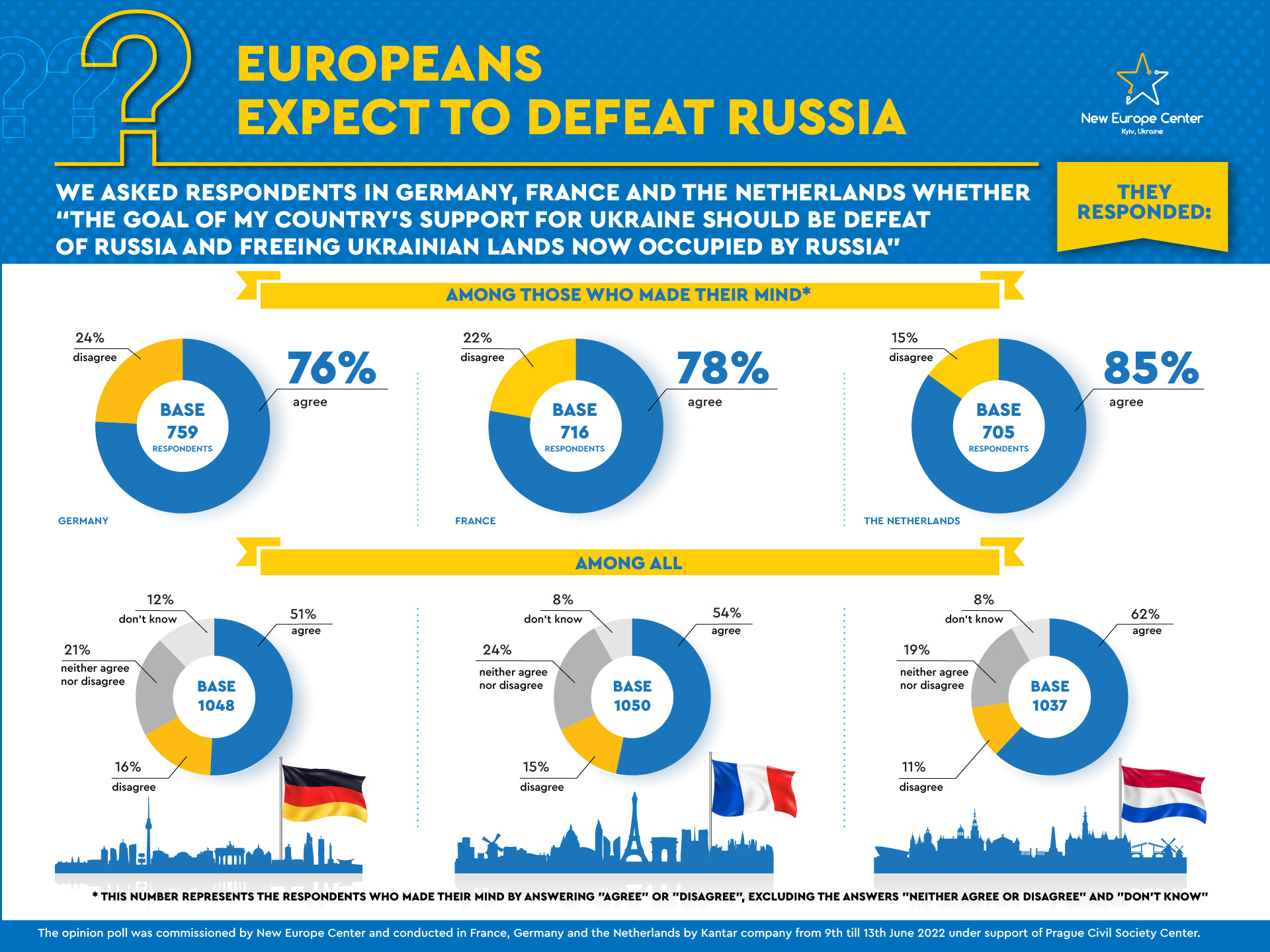The results of the newest opinion poll conducted in France, Germany and the Netherlands by Kantar company at the request of New Europe Center, Kyiv (survey took place on 9-13 June 2022).
PDF-version of analysis prepared by Leo Litra, Senior Research Fellow, New Europe Center is available:
in English here, in German here, in French here, in Dutch here.
Infographic based on the poll findings is available here: in English, Ukrainian, German, Dutch and French.
Public opinion is a central element of the decision-making in democratic societies. The Russian war against Ukraine made the West to revise its policy on Ukraine. However, the conceptual change of the EU countries towards Ukraine does not relate only to the war. For almost two decades Ukraine knocked at the EU’s door. At the end of February 2022, Ukraine submitted the application for membership in the European Union. Since then, Ukraine went through a process of preparing EU for an answer. Aside from implementing the Association Agreement and reforms meant to bring Ukraine closer to
the EU, Kyiv answered the European Commission’s questionnaire which
will determine Ukraine’s readiness to start the accession process. However, the process of joining the EU is not entirely technical. Governments of EU member states will have to give their consent to Ukraine’s EU bid by offering the EU candidate status. Such a decision cannot be taken without taking into consideration the public opinion.
The overall aim of the opinion poll was to determine the level of support for Ukraine’s aspirations to become an EU candidate and to see whether the society in Germany, France and the Netherlands are in favor of accepting new members when these are ready. Also, we could not miss the opportunity to ask about the end goal of their countries’ support in fighting back Russian aggression. The data obtained should help Germany, France and the Netherlands to develop a fact-based policy agenda towards Ukraine in what concerns Kyiv’s bid for EU membership and fighting back Russian aggression. Aside from this, it should also help Ukraine to feel better the mood in the German, French and Dutch society and adjust its policy accordingly.
Methodology
The opinion poll was conducted in France, Germany and the Netherlands by Kantar company at the request of New Europe Center. Overall, over 3100 respondents aged between 18 and 65+ answered three questions. Respondents represent their countries proportionally based on gender, age and regions. All the answers were collected on an internet-based survey taking place on 9-13 June 2022. The opinion poll was conducted with the financial support of the Prague Civil Society Center.
Questionnaire
Q1. How much do you agree or disagree with the following statement?
EU should offer candidate status (not yet full EU membership) for Ukraine as soon as possible
- a) I fully agree
- b) I partly agree
- c) I neither agree, nor disagree
- d) I partly disagree
- e) I fully disagree
- f) I don’t know / I prefer not to say
Q2. How much do you agree or disagree with the following statement?
EU should welcome enlargement to new members, when they are ready
- a) I fully agree
- b) I partly agree
- c) I neither agree, nor disagree
- d) I partly disagree
- e) I fully disagree
- f) I don’t know / I prefer not to say
Q3. How much do you agree or disagree with the following statement?
The goal of [COUNTRY]’s support for Ukraine should be defeat of Russia and freeing Ukrainian lands now occupied by Russia
- a) I fully agree
- b) I partly agree
- c) I neither agree, nor disagree
- d) I partly disagree
- e) I fully disagree
- f) I don’t know / I prefer not to say
Analysis of the answers
Q1.
Offering the EU candidate status for Ukraine is widely accepted by the society in Germany, France and the Netherlands. Among all the respondents, the number of those who agree with offering the candidate status to Ukraine as soon as possible is pretty much the same for all countries: Germany – 46%, France – 42%, Netherlands – 45%. At the same time, there is a significant part of the society who did not make their mind on the question of EU candidate status for Ukraine: 25% for Germany, 26% for France and 21% for the Netherlands. In addition to this, there is a small number of respondents who don’t know. What certainly could be interpreted as a good signal for Ukraine is the low number of the opponents for candidate status: Germany 22%, France 24% and the Netherlands 24%.
However, in order to get a better clarity, this data requests us to exclude those who are “neutral” and those who “don’t know” in order to get a better understanding of how the results would look like in case of a referendum. As one can see on the graphic below, there is an overwhelming majority of people who support Ukraine’s bid. Among those who made their mind, as much as 68% in Germany and 65% in France and the Netherlands support the EU candidate status for Ukraine. Regionally-wise, in Germany, the most supportive is the North, with 50% in favor and 14 against among all respondents. Also, gender-wise, in Germany and France, the men are more supportive than women.
This data clearly indicates that offering the candidate status does not represent a divisive issue for German, French and Dutch societies. On the contrary, there is a solid request on the side of the society to EU’s commitment for future membership of Ukraine.
Q2.
The frequent difficulties in adopting certain decisions within the EU, to name, among others, the recent EU’s 6th package of sanctions against Russia, has raised the question about the readiness to accept new members to the EU. This is precisely why we asked the three countries, known to be slightly skeptical, about the readiness to accept new EU members once these are ready. Among those who made their mind, there is an overwhelming majority in all three countries: 72% in Germany, 65% in France and 76% in the Netherlands. As for the answers among all the respondents, the German and Dutch society expressed a majority of 51% and 58% respectively. While the French society has a slightly lower support amounting to 45%. In this context, it is important to note that French is also the country with the biggest number of opponents – 25%. The numbers of those who disagree with the future EU enlargements is much lower in Germany (19%) and the Netherlands (18%). Also, as in the case of the previous question, there is a high number of those who are neutral: 24% in Germany and 25% in France. The Netherlands stands aside with 17% who remain neutral, which is lower than in France and Germany.
Q3.
The war of Russia against Ukraine and the heroic Kyiv’s resistance against the aggression is currently one of the most discussed topics in the world. Almost 50 countries provided support, military and humanitarian, to Ukraine. All the three countries, Germany, France and the Netherlands have provided support to Ukraine, but at the same time, voices from Berlin and Paris mentioned that “Ukraine should not lose”, however, without saying that Ukraine should win. This raised the questions that Berlin and Paris are willing to support Ukraine but at the same time are inadvertently calling Kyiv to make concessions and stop the war. That is precisely why New Europe Center decided to ask the societies in Germany, France and the Netherlands about the end goal of their countries’ support for Ukraine’s fighting back against Russian aggression. The data are stunning: showing a majority support in all three states for the idea that Russia should be defeated and Ukrainian territories now occupied should be freed. Among all the respondents, 51% support in Germany, 54% support in France and 62% support in the Netherlands. Only 16% disagree in Germany, 15% in France and 11% in the Netherlands. Among those who made their mind the data are even more reinforcing the idea that Russian should be defeated and occupied territories liberated. In Germany these represent 76%, in France 78% and in the Netherlands 85%. This is a strong public mandate for governments in Germany, France and the Netherlands to pursue activities meant to restore control of Ukraine over the occupied territories and provide more military support to Kyiv.











